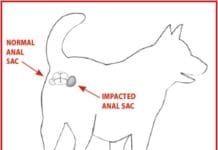Cayenne for Canines: They’re Not Too Hot!
Since 1985, the International Herb Association has announced its Herb of the Year during National Herb Week, which this year is May 1 through 7. The IHA has just published Capsicum: Herb of the Year 2016, a book that reviews chili peppers and their growing conditions and uses, and the organization helps garden centers and herb farms promote its featured plant.
Help Heal Your Dog with Common Herbs
All I could hear was the buzz of a thousand bees as I parted my way through a deep thicket of Heracleum lanatum, a tall, broad-leaved member of the parsley family commonly known as cow parsnip." The big
Blood Pressure Tests for Dogs: Worth It?
A health exam for all adults includes a blood-pressure reading. So why not for our dogs? There are a few reasons that veterinarians save blood-pressure testing for only certain cases. Although an estimated 20 percent of humans suffer from white-coat syndrome" (temporary high blood pressure caused by the anxiety associated with visiting the doctor)
Canine Parvovirus Myths and Truths
MYTH: Adult dogs don't get parvo. TRUTH: It's true that the likelihood of a serious parvo infection decreases as dogs age, and that most victims are puppies. But adult dogs can become seriously ill or die from parvo. MYTH: I can protect my dogs from exposure to parvo by maintaining a clean environment and restricting their contact with other dogs.
Parvo Victim # 1
Three days after Jonah first showed symptoms, so did his brother, Micah. Three days later, eight-year-old Tyrone and two-year-old Vivian, both Malamutes, became ill. Levy caught their symptoms early because she kept all of her dogs confined and followed them individually to check for diarrhea. Parvo's diarrhea has such a specific
Parvo Victim # 2
The name Ray Carlisle is synonymous with Doberman Pinschers. A breeder and exhibitor for 40 years, a show judge for the last 20 years, and a former president of the Doberman Pinscher Club of America, the United Doberman Club, and the American Working Dog Federation, the New York resident travels the world on behalf of his favorite breed. I vaccinated my dogs for many years
Collecting Dog Poop for Science
I was at the gym recently, swimming laps. After my workout, I was sitting by the side of the pool and a fellow swimmer and friend stopped to chat about dogs. He has never owned a dog, but his daughter has been pressuring him and he thinks she is finally old enough to take on the responsibility of caring for a dog (good dad!). So, I was anticipating a discussion about breeds, where to look, training, feeding, etc. But that is not where this was going at all. Instead, he wanted to talk about poop.
Canine Atopic Dermatitis
In late autumn, we closed our pool, an annual event that all four of our swim-loving dogs dread. They will swim as long into the fall season as we allow and I am pretty certain that our Toller, Chippy, would bring out an ice pick and break his way through the ice if he could. In addition to the daily joy, excitement, and happiness that our pool brings to us all, we have found that it has had an additional benefit for some of our dogs. The pool and the daily swims that it provides help to keep itchy dogs from itching all summer long.
The Scooting Dog Decoded
Why is Rover dragging his butt across the carpet? Not just annoying to watch, this behavior is usually indicative of a bigger problem - infected or impacted anal sacs. Also called anal glands, these little pouches are found on several different mammals including dogs and cats, and are not very noticeable when healthy. When they are clogged or infected, however, your dog will MAKE you notice them.
The Deal with Puppy Shots
You might be surprised to know that dogs don't actually need a series" of shots in order to be immunized against canine diseases. That said
Medical Marijuana for Dogs?
Would a dog benefit from using medical marijuana? Legally, they're not allowed to, but many believe it could relieve pain the same way it does for humans.
Pain Treatment for Dogs Now Commonplace in Veterinary Medicine
Do dogs feel pain? Veterinarians didn't always think so. Fortunately, now vets know that human medications like NSAIDs (Rimadyl, Metacam) and opiates (Tramadol, Amantadine) work wonders for dogs, too!
















